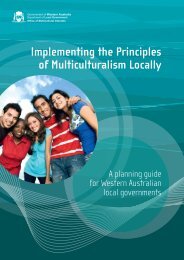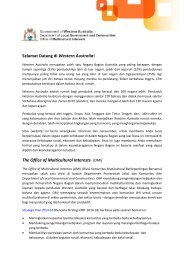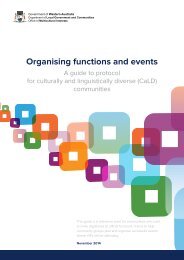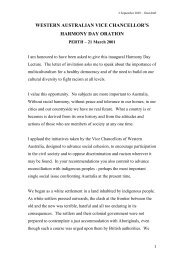Doing good by stealth, whilst flirting with racism - Office of ...
Doing good by stealth, whilst flirting with racism - Office of ...
Doing good by stealth, whilst flirting with racism - Office of ...
You also want an ePaper? Increase the reach of your titles
YUMPU automatically turns print PDFs into web optimized ePapers that Google loves.
core element <strong>of</strong> this was the progressive elaboration <strong>of</strong> race theory which developed<br />
in response to, and legitimated, British involvement in slavery and the expropriation<br />
<strong>of</strong> other peoples’ lands and resources. A second ideological element which was<br />
central to early race thinking, until substantially overtaken <strong>by</strong> scientific <strong>racism</strong>, was<br />
Christian theology. (Jordan, 1969) In the late nineteenth century ‘muscular<br />
Christianity’ provided a powerful underpinning to British expansionism in Africa and<br />
elsewhere. Race thinking (Barzun, 1965) and Christian theology and idiom continue<br />
to exist in British life as two ideological strands in a national imagery woven together<br />
like strands <strong>of</strong> DNA, <strong>with</strong> the many bridging linkages being formed around specific<br />
issues in ethnic interaction. The growth <strong>of</strong> Islamophobia in recent years has been one<br />
such highly visible, and disturbing, linkage.<br />
With this history the British, and perhaps particularly the English, are comfortable<br />
<strong>with</strong> the management <strong>of</strong> ethnic diversity. It is an established part <strong>of</strong> our political<br />
repertoire and has both the institutional structures and the conceptual language<br />
comfortably established as part <strong>of</strong> the national political fabric. Recognising ethnic<br />
diversity and managing ethnic relations does not embarrass the British either<br />
personally or politically.<br />
A sense <strong>of</strong> how important this is can be gained <strong>by</strong> comparing Britain <strong>with</strong> France,<br />
where, as an on-going consequence <strong>of</strong> the Jacobin tradition <strong>of</strong> the French Revolution,<br />
the political system is deeply uncomfortable <strong>with</strong> recognising ethnic diversity. The<br />
concept <strong>of</strong> laicite underpins a secular citizenship which is entire unto itself: not<br />
something to be fragmented <strong>by</strong> considerations <strong>of</strong> either gender, religion or ethnicity.<br />
(Hargreaves, 1995) As struggles over the wearing <strong>of</strong> the chador in school <strong>by</strong> young<br />
Muslim women have revealed, a routine acceptance <strong>of</strong> cultural diversity and<br />
differential citizenship does not sit easily <strong>with</strong> French political tradition. (Geddes,<br />
2003)<br />
In Britain on the other hand, there is both a political capacity and a language for<br />
addressing ethnic diversity. It is the language <strong>of</strong> ‘race’ and <strong>of</strong> colour. Early in the<br />
modern phase <strong>of</strong> demographic change through post-war migration <strong>of</strong> labour from the<br />
3










